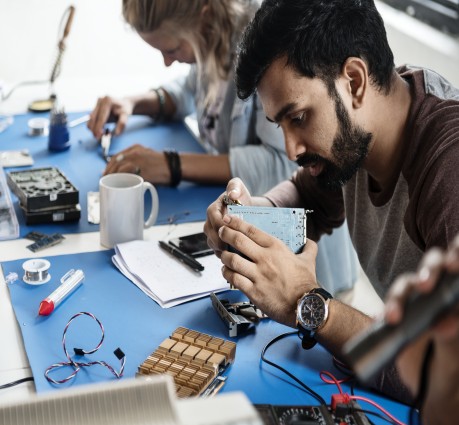Engineering is the creative application of science, mathematical methods, and empirical evidence to the innovation, design, construction, and maintenance of structures, machines, materials, devices, systems, processes, and organizations. The discipline of engineering encompasses a broad range of more specialized fields of engineering, each with a more specific emphasis on particular areas of applied mathematics, applied science, and types of application. Dr. C. V. Raman Institute of Science & Technology is one of the leading faculties of Dr. C. V. Raman University. Engineering and Technology is a broad set of disciplines that deal with everything connected to the design, manufacture, and maintenance of infrastructure, devices, tools, and information systems used by people on a daily basis.
Duration of Program
Level of Study

Gains hardware and software knowledge .
Fundamental topics, language learning, workshops
Specialise in electrical devices, circuits, communication, and digital electronics.
Deeper study of power systems, communication, and automation.
PSO1 Engineering knowledge : Apply the knowledge of mathematics, science, engineering fundamentals, and an engineering specialization to the solution of complex engineering problems.
PSO2 Problem analysis : Identify, formulate, review research literature, and analyze complex engineering problems reaching substantiated conclusions using first principles of mathematics, natural sciences, and engineering sciences
PSO3 Design/development of solutions : Design solutions for complex engineering problems and design system components or processes that meet the specified needs with appropriate consideration for the public health and safety, and the cultural, societal, and environmental considerations.
PSO4 Project management and finance : Demonstrate knowledge and understanding of the engineering and management principles and apply these to one’s own work, as a member and leader in a team, to manage projects and in multidisciplinary environments.
PSO5 Individual and team work : Function effectively as an individual, and as a member or leader in diverse teams, and in multidisciplinary settings.
PSO6 Communication : Communicate effectively on complex engineering activities with the engineering community and with society at large, such as, being able to comprehend and write effective reports and design documentation, make effective presentations, and give and receive clear instructions.
PSO7 The engineer and society : Apply reasoning informed by the contextual knowledge to assess societal, health, safety, legal and cultural issues and the consequent responsibilities relevant to the professional engineering practice.
PSO8 Modern tool usage : Create, select, and apply appropriate techniques, resources, and modern engineering and IT tools including prediction and modeling to complex engineering activities with an understanding of the limitations
PSO9 Environment and sustainability : Understand the impact of the professional engineering solutions in societal and environmental contexts, and demonstrate the knowledge of, and need for sustainable development.
PS10 Life-long learning : Recognize the need for, and have the preparation and ability to engage in independent and life-long learning in the broadest context of technological change.